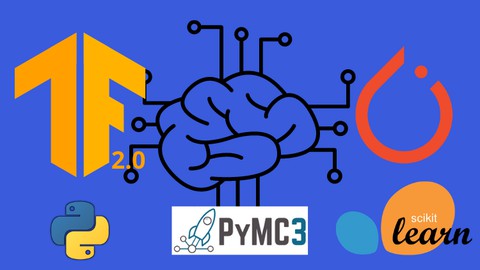Machine Learning, Deep Learning and Bayesian Learning

What you’ll learn
-
Deep Learning with Tensorflow!!!
-
Deep Learning with PyTorch!!! Yes both Tensorflow + PyTorch!
-
Bayesian learning with PyMC3
-
Data Analysis with Pandas
-
Algorithms from scratch using Numpy
-
Using Scikit-learn to its full effect
-
Model Deployment
-
Model Diagnostics
-
Natural Language Processing
-
Unsupervised Learning
-
Natual Language Processing with Spacy
-
Time series modelling with FB Prophet
-
Python
Description
This is a course on Machine Learning, Deep Learning (Tensorflow + PyTorch) and Bayesian Learning (yes all 3 topics in one place!!!). Yes BOTH Pytorch and Tensorflow for Deep Learning.
We start off by analysing data using pandas, and implementing some algorithms from scratch using Numpy. These algorithms include linear regression, Classification and Regression Trees (CART), Random Forest and Gradient Boosted Trees.
We start off using TensorFlow for our Deep Learning lessons. This will include Feed Forward Networks, Convolutional Neural Nets (CNNs) and Recurrent Neural Nets (RNNs). For the more advanced Deep Learning lessons we use PyTorch with PyTorch Lightning.
We focus on both the programming and the mathematical/ statistical aspect of this course. This is to ensure that you are ready for those theoretical questions at interviews, while being able to put Machine Learning into solid practice.
Some of the other key areas in Machine Learning that we discuss include, unsupervised learning, time series analysis and Natural Language Processing. Scikit-learn is an essential tool that we use throughout the entire course.
We spend quite a bit of time on feature engineering and making sure our models don’t overfit. Diagnosing Machine Learning (and Deep Learning) models by splitting into training and testing as well as looking at the correct metric can make a world of difference.
I would like to highlight that we talk about Machine Learning Deployment, since this is a topic that is rarely talked about. The key to being a good data scientist is having a model that doesn’t decay in production.
I hope you enjoy this course and please don’t hesitate to contact me for further information.
Who this course is for:
- Anyone interested in Machine Learning.






